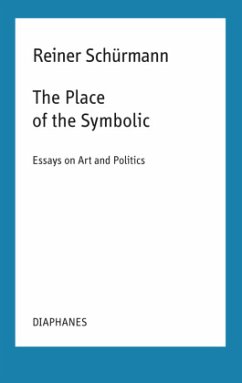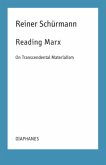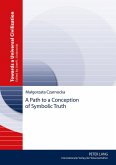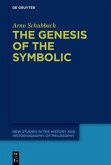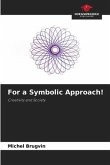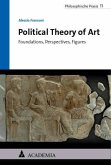The Place of the Symbolic brings together Reiner Schürmann's essays on the nexus between art and politics. In keeping with his translation of the destruction of metaphysics into an an-archic philosophy of practice, Schürmann here develops a radically immanent theory of the place of symbols, irreducible to both Idealist theories and structuralist accounts of the symbolic such as Jacques Lacan's. Symbols, Schürmann argues in some of his earliest texts, may provide a bridge between ontological difference and politics. They resist being grasped metaphysically, in terms of representation. Instead their understanding requires a specific way of existence: attending to the coming-to-presence of phenomena. As such, the understanding of symbols discloses a form of praxis that abandons ultimate grounds and opens onto the manifold.
Alongside Schürmann's theory of symbols, the collection includes essays on the interaction of metaphysics, tragedy and technology, on the "there is" in poetry, as well as reflections on judgment. Throughout these characteristically lucid interventions, Schürmann's most urgent concern remains a consideration of singular and finite practices that enact a release from universal principles. Art and politics appear here as the unworking of ultimate grounds; that is, as practices attuned to a truly groundless form of life.
Alongside Schürmann's theory of symbols, the collection includes essays on the interaction of metaphysics, tragedy and technology, on the "there is" in poetry, as well as reflections on judgment. Throughout these characteristically lucid interventions, Schürmann's most urgent concern remains a consideration of singular and finite practices that enact a release from universal principles. Art and politics appear here as the unworking of ultimate grounds; that is, as practices attuned to a truly groundless form of life.
"In this collection, Schürmann compellingly shows how the place of symbols, or what he calls the 'symbolic difference,' is the inaugural and inexhaustible site of the presencing or letting-be of being, the site of possibility (the 'not-yet'). With these essays, Schürmann significantly develops his thinking on how we think and act in our present moment of 'broken bonds.' The volume is beautifully edited by Kieran Aarons and Nicolas Schneider, who provide a nuanced and beautiful concluding essay on Schürmann's thinking of the symbolic difference in the light of his theory of broken hegemonies."
-Peg Birmingham, Professor of Philosophy, DePaul University; author of Hannah Arendt and Human Rights (Indiana University Press, 2006)
-Peg Birmingham, Professor of Philosophy, DePaul University; author of Hannah Arendt and Human Rights (Indiana University Press, 2006)

